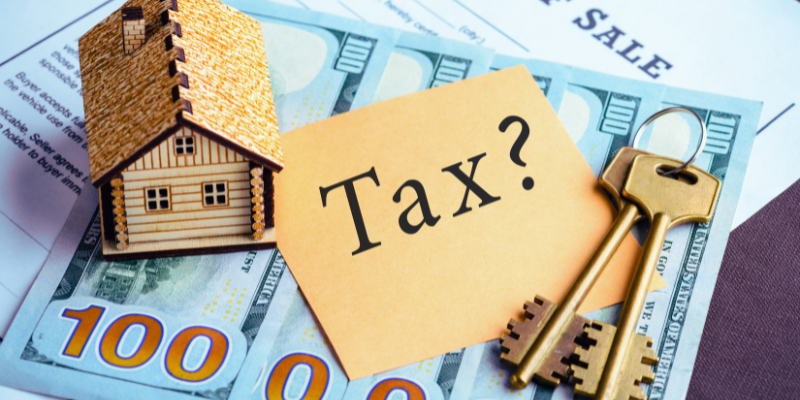
Selling a Home in Wilmington, DE: Tax Implications Explained
Not only do you have to find the right buyer for your Wilmington, DE home, but you also have to get ready for the taxes that come with the sale. It can be hard to deal with the money side, especially when figuring out who pays what. This guide is meant to help Wilmington homeowners understand the taxes they’ll have to pay when they sell their home. This resource will help you with a financially sound deal and fewer surprises, whether you’re selling your home for the first time or have done it before.
Key Highlights
- Understanding tax implications can significantly affect your net profits in Wilmington, DE.
- Capital gains exclusions may reduce your taxable amount by $250,000–$500,000, depending on your filing status.
- Delaware charges a 4% transfer tax, split between buyer and seller, impacting sale expenses.
- Strategic estate planning can lower liabilities and protect wealth for heirs.
- Professional tax guidance ensures compliance and supports better financial results.
Understanding Taxes When You Sell Your Home
Selling a house in Wilmington, DE requires awareness of multiple tax considerations. Among the most pressing is how capital gains taxes might influence your sale profits. Sellers need to learn about Delaware’s rules, what they can and can’t do, and their overall tax responsibilities before they sell. Knowing how much you owe ahead of time helps you get the most money and makes the selling process go more smoothly. This section talks about the tax problems that Wilmington homeowners need to know about and gives useful tips on how to deal with them.
What Are Capital Gains Exclusion Options?

One of the biggest concerns for sellers is the effect of capital gains taxes on the sale proceeds. These taxes apply to the difference between your home’s selling price and what you originally paid. Wilmington homeowners can take advantage of IRS exclusions designed to ease this burden. If you’ve lived in the home as your primary residence for two of the last five years, you could exclude up to $250,000 of profit if single, or $500,000 if married filing jointly.
To qualify, you must have the correct paperwork. Keep records of any changes you make to the home that affect its foundation, as well as proof that you live there and own it. These forms can help you get the most out of your deduction and pay less in taxes on your gain. Remember that the exclusions don’t apply if you bought the home through a like-kind swap or inherited it within the last five years. In those cases, there are different rules that apply.
The ban can’t be used again if it was used on another property within the last two years. Because of these limits, buyers should talk to a certified tax professional to come up with plans and avoid making mistakes that will cost them a lot of money. To sum up, if you plan ahead and keep good records, you can make the most of tax breaks while still following all IRS and Delaware rules.
Exploring Tax Rates in Wilmington, DE
When you want to sell your home in Wilmington, you need to know about the tax rates. If you’re selling a home in Delaware, you should know that there are some costs you should expect. There isn’t a separate capital gains tax in Delaware. However, profits from the sale of a home are taxed at the federal level, and income-based rates can go up to 20%.
On the state side, Delaware impacts sellers mainly through property and transfer taxes. Though Wilmington does not add its own sales taxes, the Delaware Division of Revenue still requires that sellers report property sales, which may influence their overall income tax bracket. This means a large gain from selling could push you into a higher bracket, raising your tax bill.
Sellers, including investor home buyers in Wilmington, can avoid underestimating their debts by carefully organizing their records and knowing how different taxes affect each other. This knowledge is especially helpful when making plans for future investments or figuring out what to do with the money you make from a sale. If you want the best results, you should talk to a tax expert who knows Delaware law. This goes for both homeowners and investors. This way, you can be sure that your responsibilities are taken care of and you can move on to the next chapter with confidence.
Transfer Taxes: Who Pays and How Much?
In Wilmington, transfer taxes play a central role in calculating the real cost of a home sale. Sellers must understand who pays and how the amounts are calculated since these costs directly affect profits. Transfer taxes are usually shared between buyer and seller, making it important to review agreements closely.
If you know how the taxes will be split up front, you can plan for costs and avoid arguments at the last minute. The normal transfer tax in Delaware is 4% of the sale price, and each party usually pays half of it. If sellers know this ahead of time, they can make plans and keep their financial goals realistic.
Understanding Property Transfer Taxes
When people buy and sell homes in Wilmington, DE, property transfer taxes play a big role. When someone buys or sells a house, they have to pay these state and sometimes city fees. People who buy and sell things in Delaware generally agree to split the 4% transfer tax in half, so each person pays 2%.
You should include this cost in your budget early on so that you don’t get caught off guard. It may seem like just another problem, but the tax money helps pay for things like public buildings and roads in the area. It might be easier for you to give up the sale money if you think of it as a donation to a good cause. There may also be legal issues that come up during or after a home sale, like how to remove a name from a deed. This is especially true if the owners are getting divorced, inheriting the property, or changing how they own it together. The transfer will go more smoothly and correctly if you get help from a professional and know what to do.
There are some exceptions, like when family members move property or when the government sells something. But buyers must meet strict requirements for paperwork in order to be eligible. By knowing these rules and getting your paperwork ready ahead of time, you can make things easier while still following Delaware law. This is especially important when dealing with situations like for sale by owner buyers agent commission in Newark, DE, where clear agreements help avoid confusion and ensure compliance.
Estimating Your Tax Obligations

To avoid financial shocks, it’s important to get your tax estimates right. In Wilmington, people who want to sell their home should first figure out the 4% transfer tax. In this case, if you sell a house for $300,000, the total tax is $12,000. Usually, each side pays $6,000.
In addition to transfer taxes, sellers must also consider repair, staging, and legal expenses, which impact net proceeds even though they aren’t taxes. Overlooking these costs can throw off planning and lead to frustration at closing. To stay on track, many sellers consult tax professionals, who can help with projections and ensure nothing is missed.
Also, keep an eye on updates to Delaware’s tax laws. Any changes could affect your costs or even provide new savings opportunities. Staying informed gives you an advantage when you want to sell your house fast in Delaware, since you can adjust your strategy before finalizing a sale. Having accurate estimates allows you to enter the closing process with confidence and helps you avoid unexpected issues.
Capital Gain Tax Implications for Home Sellers
When selling in Wilmington, DE, capital gains taxes directly influence the profit you take home. These taxes apply when your property’s sale price is higher than its adjusted basis. By preparing for them in advance, sellers can structure sales to minimize liabilities and retain more earnings.
This part talks about how capital gains taxes affect profits and how to lessen their effects, so sellers can make smart choices during this big financial event.
How Gain Tax Affects Your Profit
Capital gains taxes can greatly affect your bottom line when selling a home. The tax is based on the difference between your sale price and adjusted basis, which includes the original purchase price plus improvements. Depending on how long you’ve owned the home, taxes are classified as short-term or long-term. Short-term gains (ownership under one year) are taxed as ordinary income, while long-term gains receive lower federal rates of 0%–20%.
For many homeowners, the primary residence exclusion offers relief. If you’ve lived in the house for two of the past five years, you may exclude $250,000 if single or $500,000 if married filing jointly. To qualify, keep detailed records of residency and improvements. These exclusions reduce taxable income significantly, boosting profits from the sale.
There is no capital gains tax in Delaware, but federal rules still apply. When you sell your home is very important because big gains can put you in a higher income bracket. If you plan ahead with the help of a tax expert, you can avoid unpleasant tax increases and keep as much of your profit as possible.
Strategies to Minimize Tax Liability
Reducing tax liability requires a strategic approach. Start with the primary residence exclusion, which instantly reduces taxable income by up to $250,000–$500,000 depending on filing status. Beyond that, documenting home improvements helps raise your property’s basis, reducing the amount subject to tax.
Timing also matters. Selling in a year with lower overall income could place you in a reduced bracket, lowering your gains tax rate. For investors, a 1031 exchange offers the chance to defer taxes by reinvesting proceeds into another property, though it typically doesn’t apply to primary residences.
Sellers in Wilmington benefit from professional guidance tailored to Delaware’s tax rules. Experts can recommend the right mix of timing, deductions, and strategies for your situation. By carefully planning ahead, you preserve more of your gain while avoiding compliance issues — ensuring your home sale is both profitable and legally sound.
| Aspect | Criteria | Impact on Profit | Exemption Eligibility | Strategy to Minimize |
|---|---|---|---|---|
| Ownership Period | Less than 1 year | High tax impact | Not eligible | Consider renting to reach 2-year mark |
| Ownership Period | 2+ years | Lower tax liability | Eligible for $250k/$500k exemption | Plan sale after meeting criteria |
| Property Improvement | Documented upgrades | Increases cost basis | N/A | Keep records for deductions |
| Primary Residence Use | Consistent use as main home | Reduces taxable gain | Eligible | Maintain and prove residency |
This summary outlines key aspects affecting capital gains for home sellers in Wilmington, DE, focusing on how different ownership periods and property uses influence tax liability. To minimize tax impact, strategies such as adjusting the sale timeline and documenting improvements are recommended. Ensuring eligibility for exemptions can significantly affect profit margins.
Navigating Estate Planning and Taxes
When selling a house in Wilmington, DE, it’s wise to consider how real estate fits into your broader estate planning strategy. The way assets are structured and transferred can greatly influence tax responsibilities, inheritance outcomes, and overall financial stability. Thoughtful planning ensures real estate assets are passed on efficiently, minimizing tax burdens while preserving more wealth for future generations. By being aware of estate transfer taxes and related costs, sellers can make smarter decisions that align with long-term goals. This section explores practical strategies for combining real estate with estate planning to reduce expenses and safeguard assets.
Incorporating Real Estate into Your Estate Plan

Integrating real estate into an estate plan requires careful attention to both tax rules and long-term family needs. Selling property can trigger capital gains taxes, estate transfer taxes, and other liabilities, but strategic planning helps minimize these. One effective method is creating a living trust, which allows property to bypass the probate process. This approach saves time, reduces costs, and protects assets from unnecessary estate taxes while giving you more control over how heirs receive them.
Another key tactic involves taking advantage of the step-up in basis. When property transfers upon death, its value is reset to the current market rate, reducing future capital gains taxes for heirs. This rule can deliver major savings by lowering the taxable gain when beneficiaries eventually sell. Gifting strategies also play a role; transferring property during your lifetime can reduce taxable estates by using annual exclusions or lifetime exemptions, though this must be carefully managed to avoid unexpected tax consequences.
For Wilmington sellers, being aware of primary residence exclusions is equally important. If the property qualifies, you may reduce capital gains taxes considerably before passing it into estate structures. Pairing this with proper documentation ensures compliance with both federal and Delaware tax laws. Ultimately, estate planning with real estate is about striking a balance—leveraging trusts, exclusions, and gifting while preserving flexibility. Working with professionals familiar with Wilmington’s tax environment provides the best path forward, ensuring real estate remains a strong part of your estate while maximizing what you pass on to heirs.
Wrapping Up: Tax-Savvy Selling in Wilmington, DE
Selling a home in Wilmington, DE, can feel complicated when it comes to taxes, but knowledge is your best advantage. By preparing for capital gains taxes, transfer fees, and potential exemptions, you can avoid unexpected costs and protect your financial well-being. Many homeowners find that professional guidance is invaluable, helping them stay compliant while also maximizing results. Whether your focus is on increasing profits, minimizing tax liabilities, or planning for future heirs, staying tax-smart ensures long-term success.
And remember, Swift Cash House Buyer buys houses for cash in any situation. Reach out today if you’re looking for a fast, stress-free option. For more details on navigating the tax side of selling, be sure to download our complete guide to home sale tax strategies in Wilmington.
FAQs
What are capital gains exclusions when selling a home in Wilmington, DE?
If you’ve lived in the house for at least two of the last five years, you may exclude up to $250,000 (single) or $500,000 (married filing jointly) from your taxable gain.
Who pays the transfer tax in Delaware when selling a property?
The transfer tax is typically split evenly, with buyer and seller each covering 2% of the sale price, unless otherwise negotiated.
Are there exemptions to property transfer taxes in Wilmington, DE?
Yes, exemptions exist for certain cases, such as family transfers or transfers to government entities. Each requires proper documentation to prove eligibility.
How can estate planning minimize taxes when selling a home?
Tools like living trusts can help bypass probate and reduce transfer taxes. Using the step-up in basis rule and residence exclusions further limits tax exposure.
Why should a seller consider professional tax advice?
A qualified advisor ensures compliance with federal and state laws while guiding on exclusions, deductions, and strategic planning to reduce liabilities and improve outcomes.
Helpful Wilmington Blog Articles

